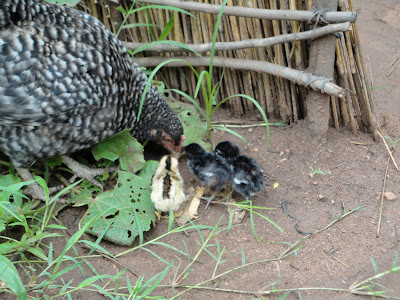This week my good friend from Seattle (now living in Lusaka) came over to check out village life. Laura is a nurse like me but since she is not in the Peace Corps, she has no restrictions on doing hands-on care. She hit it off with the midwives and was helping to catch babies in no time!
Laura got on a bus in Lusaka at 10:30 which sat, and sat, and sat in the bus depot until almost 6pm! Meanwhile I had travelled to the Zambian border town of Chipata, to meet her and spend the night before we continued to my village. She finally arrived at 2am. We got a few hours sleep and then rode about eight more taxis, minibuses, and trucks to arrive in Balang'ombe just before sunset.
Laura took to village life like a real trooper- bucket baths, candlelight, the constant flow of visitors (and people curious to see the new azungu)- no prob! And thank God Laura is a dog person. She had a mesmerizing ability to calm Innocent, whereas I have no idea what to do with this newly fat, happy and HYPERACTIVE dog.
By the way- Innocent is a little Wakuba- thief. She can't figure out where her own tail is it seems but she is excellent at noticing when my neighbors are cooking nsima so she can sneak a patty back out to my yard. We took Inno to the market and she started gnawing on some corn fritters that were for sale (don't worry, we bought them). For the rest of the market, Laura held Inno to keep her from stealing stuff, and people found this VERY interesting. Not only is this a brand new azungu, but she's holding a dog! Crazy. We were looking in the famous 20 kwatcha pile and I held up a weird looking pastel ski mask. Ohmygod! Laura said- it's a doggie sweater! So now everyone was staring at the new azungu holding a dog that was wearing a sweater. I had already assumed that most of the people in my village think I am crazy. Is there a level above crazy?
In the evenings, we would sit outside, drink our tea, and watch as Inno and Rocky (my neighbor's dog) played and growled and rolled around in the dirt. The gaggle of local girls who like to hang out at my house came over almost every night, and sometimes, when things got slow, I would blow them some bubbles (which they love more than candy). We were sitting out there, and Laura was like, 'I love this. I could totally live in a village and be happy.' Yup. So can I. :-)
 |
| My Little Visitors |
Starting on Monday, Laura headed over to the Labor and Delivery wing of the Health Centre and started helping out. In fact, when we first arrived, a baby was already crowning. The birth was totally normal, but the mom (17 y/o) was really having a rough time and her Agogos were screaming at her to push harder and at one point even hit her. Laura just started cooing and holding the Mother's hand and the baby slid right out.
For baby number two, I was teaching my English class while Laura spent the entire day with the mother in labor. It was another normal pregnancy, and then THAT baby slid out, Laura caught it, with the midwife looking on. The mom named the baby girl "Rola" (Malawians can't pronounce 'Laura').
The third baby was breech, butt first. The poor midwife had been calling for an ambulance all night but because of the fuel shortage nothing came. The midwife warned the Agogos that the birth was very risky and the baby might not make it. When it was finally out, it was blue and not breathing. There was no suction, so they just hand- bagged it for a few minutes and rubbed it and prayed. Then there was the best sound of all- the baby cried and I got to be the first to tell the Agogos that the baby lived and that it was a girl. Timasangalala Kwambiri!!
Needless to say, Laura had a great time with the baby-mommas and midwives.




